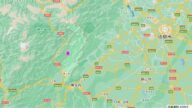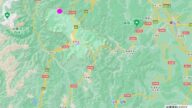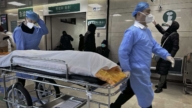【新唐人2013年04月23日讯】中国四川雅安发生地震后,很多民间团体和志愿者自发组织,前往灾区捐款、捐物进行援助,但却因为当局命令:未经批准不得进入灾区。当局还建议赈灾尽量捐钱,不捐物,并由官方救济渠道统一转交给灾区。一些由人权活动人士组成的救灾团体,也遭到了中共当局的所谓“维稳”扣押。
四川雅安芦山地震发生当天,全国各地的民众迅速在网上组成了各种自愿救援团前往灾区,一些民间慈善团体、民权活动人士等也纷纷展开救援行动,但却受到了重重阻力。
中国天网人权事务中心负责人黄琦,在听到雅安地震的消息后,第一时间组织了四人救灾团队,从成都出发,赶往芦山县灾区,却在雅安市内遭到维稳部门阻拦。
黄琦:“到了雅安应当是下午六点过一点儿,然后就被大约有几十个警察和不明身份的人员拦截,拦截之后把我们弄到一个当地的警察局里面。”
黄琦表示,被扣押期间,雅安当地国保人员和地方警察对他们的身份进行了调查,并在调查结果出来后,表示不欢迎他们。
黄琦:“官方主要是要求我们别在这个时候跑到雅安去‘添乱’,警方就明确告诉我,我们这样前往灾区去的话,对当地不利,而且警方对我们的用意和意图是心知肚明的。明确就告诉我们,希望我们在这段时间别往灾区跑,整的双方都很不体面。”
黄琦指出,因为在08年汶川地震期间,他曾报导揭露了造成无数学童遇难的豆腐渣校舍丑闻,而这次雅安地震后,“天网”再次揭露了在“4.20雅安地震”中垮塌的新豆腐渣工程,当局对此非常忌惮,担心他们深入灾区后会了解到更多的实情。
黄琦:“官方是不希望我们和灾民有更深联系,我想最主要的原因,他们不希望我们揭露4.20灾害发生后出现的诸多问题。”
4月21号,也就是地震发生的第二天,中共外交部发表声明说:“中方搜救和医疗力量有保障,救灾物资充足,暂时不需要外国救援队、医疗队和救灾物资”。而另两则来自官媒的新闻却说“救灾物资紧缺,急需3万帐篷、4万衣被。”;“雅安缺水缺食物,目前的水只能维持3天。”
完全相反的新闻被拼接在一起转发后,激起了舆论强烈谴责。
深圳独立作家朱建国:“我估计它主要是为了封锁灾区的信息,因为如果有其他的第三方救援力量到场,那么灾情的真相就不可能按照政府的希望来公布了,他就会有许多政府不希望的信息披露出来,为了防止政府不希望的信息传播,所以政府在第一时间拒绝了国外甚至民间的救援力量。”
而另一条由国务院下达的通知则将民众不满的情绪推向高潮,通知要求:各地区、单位、社会团体、群众,未经批准不得自行前往灾区,如有意捐赠,建议捐赠资金,由官方转给灾区。
多数网民对当局在救灾物资如此紧缺的情况下,还拒绝捐物,主张捐钱,而感到气愤,网民表示绝对不会捐给官方一分钱。
黄琦:“官方也明确说明要我们通过警方去转交,我就告诉他们我们不可能通过你们去转交,很多红十字会的贪腐案件已经让你们声名狼藉,我们不会再往你们官办的红十字会里面丢一分钱。”
有网友指出,从中共这种封锁、封闭式的救灾方针可以看出,稳定仍然是当局考虑的第一要素,而不是人民的生命。对此,民众对政府已经彻底心寒。
采访/陈汉 编辑/张天宇 后制/李若琳
China: stability maintenance made priority over earthquake rescue
After the Ya’an earthquake, many civil society groups
and volunteers rushed to rescue the disaster areas.
However, the Chinese Communist Party (CCP) authorities
openly banned entry into the region, without prior approval.
The regime encouraged donation of money
rather than supplies.
The donated money was claimed to have been transferred
to the quake victims by the authorities.
In reality, some civil rights activists, who volunteered
to rescue at the scene, were even held in custody by the local stability preservation authority.
After an earthquake hit Lushan county in Ya’an,
volunteers nationwide formed rescue groups and headed to the quake-hit regions.
Some non-official charities and civil rights activists
have also joined their ranks.
Yet, they have encountered heavy obstacles.
Huang Qi, founder of China Tianwang Human Rights Service,
leading three other volunteers, rushed to Lushan from Chengdu.
When entering Ya’an city, the four were blocked
by the local stability maintenance department.
Huang Qi: “It was about 6pm when we arrived in Ya’an.
Dozens of police and unknown people blocked our way.
We were taken to a local police bureau.”
Huang Qi says that local domestic security police
investigated their identities.
When finding out the result, the police told them
that they were, “not welcome.”
Huang Qi: “The authorities asked us not to ‘cause troubles’
in Ya’an at this moment.
The police told me clearly that going to the quake-hit areas
would be bad for the locals.
They were well aware of our intention to go there,
but they prevented us.
That made both sides unseemly.”
Huang Qi adds that after the 2008 Wenchuan earthquake,
he has exposed scandals of jerry-built school buildings, which had claimed numerous children’s lives.
Currently, the Tianwang service has again disclosed
jerry-built projects that collapsed in the Ya’an earthquake.
The CCP authorities feared that once they arrived
at the scene, they would learn more truth, Huang says.
Huang Qi: “The authorities don’t want us to have
close contact with local quake victims.
I think this is mainly because they don’t want us
to expose problems caused by the quake.”
On April 21, the day after the Ya’an earthquake,
China’s Foreign Affairs Ministry issued a statement.
It said that China has reliable rescue and medical forces,
and adequate relief supplies.
For the time being, there is no need for foreign
rescue teams, medical teams and relief materials.
However, there appeared two other news reports
in official media, which read, “shortage of relief supplies,
in urgent need of 30,000 tents and 40,000 clothing
And blankets,” and, “Ya’an has shortage of water and food.
Now there is only enough water to last three days.”
Totally contrary news has provoked
a public outcry.
(Independent writer, Shenzhen) Zhu Jianguo: “I think
it mainly wants to block truth about the disaster areas.
If any other third-party rescue forces arrived there,
the truth would be disclosed against the authorities’ wish.
So the government rejected foreign and even non-official
rescue forces at the earliest start time.”
The State Council issued a notice, causing
the popular discontent to climax.
Its requirements read, “All institutions, social organizations
and the masses nationwide are prohibited from going to quake-hit areas without prior official approval.”
“It is recommended that all money donated to the quake-
stricken areas be sent via the authorities.”
Lots of netizens were angered by the fact that the CCP
authorities refused supply donations, but
encouraged monetary donations, especially under
severe shortage of relief materials.
They said that no penny will be given
to the authorities.
Huang Qi: “The authorities also told us the police would
forward our donations to the victims.
I told them, ‘It’s impossible to place (money)
in your care.
The Red Cross has been notorious for its corruption.
I won’t drop a penny in your official Red Cross.”
Netizens commented that the CCP regime has insisted
on taking a closed approach to rescue.
This shows that it still prioritizes stability maintenance
over people’s lives, which runs contrary to public expectations.
























